| Srl | Item |
| 1 |
ID:
152232
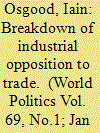

|
|
|
|
|
| Summary/Abstract |
This article documents systematic deviations from standard models of trade politics, each of which has the effect of undermining sustained efforts at coherent industrial opposition to trade. Industries have internal disagreements about liberalization, support for trade liberalization extends bilaterally across borders in the same industry, and comparative disadvantage industries feature convincing expressions of public support for liberalization. These surprising outcomes are explained by a model of trade politics that emphasizes three factors: firm heterogeneity in export performance, product differentiation, and reciprocal liberalization. The author uses a new data set of industry attitudes about fifteen US trade agreements to show that product differentiation is strongly correlated with these outcomes, even conditional on plausible alternatives. The author concludes that public position-taking and lobbying on trade politics have been fundamentally altered by the rise of product variety; trade's opponents and indifferents have been overwhelmed by pro-globalization firms breaking out to support trade on their own.
|
|
|
|
|
|
|
|
|
|
|
|
|
|
|
|
| 2 |
ID:
120113
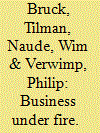

|
|
|
|
|
| Publication |
2013.
|
| Summary/Abstract |
In this article, we provide an introduction to the Special Issue of the Journal of Conflict Resolution devoted to the impact of violent conflict on entrepreneurship in developing countries. First we note that there is insufficient attention in the literature on the impact of violent conflict on the firm or entrepreneur level. Then, after we define entrepreneurship and violent conflict, we provide a summary of the existing literature and give an overview of the contributions in this Special Issue. We conclude by noting policy implications and areas for further research.
|
|
|
|
|
|
|
|
|
|
|
|
|
|
|
|
| 3 |
ID:
120118
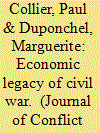

|
|
|
|
|
| Publication |
2013.
|
| Summary/Abstract |
This article positions itself among the very rare microeconomic analyses on the consequences of civil war. Up to now, most analyses on this topic are based on household surveys. The originality of the present study is that it investigates for the first time the likely predominant route by which civil conflict affects the economy, specifically through firms. The context of the study is Sierra Leone, a country that was ravaged by violent conflict from 1991 to 2002. The approach is to use geographical variations in the intensity of conflict to estimate the impact of violence on firms, on which we have data from the World Bank 2007 Employers' Survey. The proposed theory is that during conflict, violence affects production through a form of technical regress and demand through a reduction in income. The persistent post-conflict effects are less obvious. We assume that war forces a prolonged contraction in output skills, which slows the pace of recovery. We termed this phenomenon "forgetting by not doing". The results confirm our theory: the size of firms in 2006 is negatively affected by the intensity of the war in the area it operates. The analysis of training needs clearly corroborates the long-lasting lack of skills experienced as a result of the war in areas where the conflict was more intense. Yet, the analysis cannot identify robust recovery patterns.
|
|
|
|
|
|
|
|
|
|
|
|
|
|
|
|
| 4 |
ID:
172841
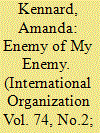

|
|
|
|
|
| Summary/Abstract |
Policies to mitigate global climate change entail significant economic costs. Yet a growing number of firms lobby in favor of regulation to mitigate carbon emissions. Why do firms support environmental regulations that directly increase production costs? This question is all the more puzzling in a globalized economy where regulation may undermine the competitiveness of domestic firms at home and abroad. By imposing differential costs on participants in the domestic market, policies designed to mitigate carbon emissions shift market share toward firms with low anticipated adjustment costs. I develop and test a model of climate change policymaking in the presence of market competition and open borders. Heterogeneity in adjustment costs induces a preference for regulation among low-cost firms. Firms facing import pressure—or export competition—may prefer stringent regulation if costs are sufficiently asymmetric. Firms embedded in global value chains also benefit if regulation raises the costs of domestically produced intermediate goods.
|
|
|
|
|
|
|
|
|
|
|
|
|
|
|
|
| 5 |
ID:
094627
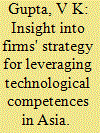

|
|
|
| 6 |
ID:
111844


|
|
|
|
|
| Publication |
2012.
|
| Summary/Abstract |
How do property rights become secure? How does rule of law take hold in an economy? The author uses an original survey of 516 firms in Russia and Ukraine, as well as interview-based case studies, to reexamine these fundamental issues of political economy. Most states in the developing world lack the requisite time horizons and institutional capacity to make the credible commitments emphasized in the literature. In this context, the author argues that firms can enforce their property rights without resort to mafias by forming alliances with stakeholders such as foreign actors, community residents, and labor. These stakeholders can impose costs on the potential aggressors through diverse political strategies, allowing firms to defend their property rights not only from private predators but also from the state. The article evaluates this "bottom-up" theory of secure property rights against existing state-based theorizing.
|
|
|
|
|
|
|
|
|
|
|
|
|
|
|
|
| 7 |
ID:
145751
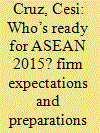

|
|
|
|
|
| Summary/Abstract |
New-new trade theory makes predictions regarding the types of firms most likely to benefit from increases in economic openness. This paper exploits the launch of the ASEAN Economic Community in 2015 to test predictions regarding the types of firms that are optimistic about, and prepared for, increased regional integration.
|
|
|
|
|
|
|
|
|
|
|
|
|
|
|
|